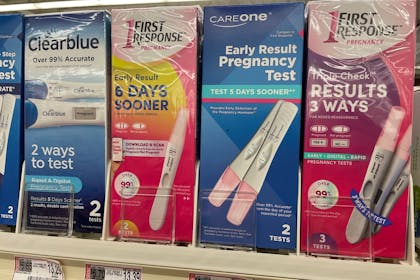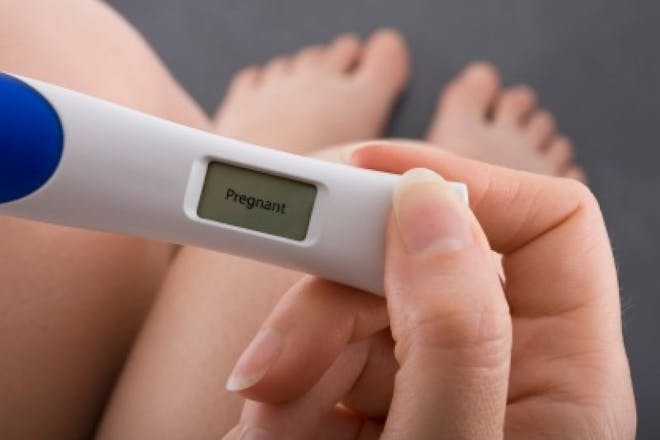Trying to get pregnant and ready to test? Avoid confusion and false pregnancy test results with these tips on what not to do before taking a pregnancy test.
When you're trying to get pregnant, you can be juggling lots of things, including monitoring when you're ovulating, calculating missed periods, choosing pregnancy tests and working out how to use and read your tests! You know what you need to DO, but about what you need to AVOID?
We've come up with a list of tips so that you know what not to do before taking a pregnancy test – meaning you can reduce the possibility of messing up, getting confused or being hopeful or disappointed due to inaccurate results like a false negative or a false positive.
Follow these tips to get as accurate a pregnancy test result as possible.
FREE NEWBORN NAPPIES
1. Don't drink before taking a pregnancy test
It's important not to consume excessive liquids before taking your pregnancy test as it could dilute your urine. This goes for any liquid, from water, tea, coffee or alcohol.
Drinking before taking a pregnancy test could result in the concentration of hCG (pregnancy hormone) would be lower in your urine sample, making it more difficult to detect with a test.
This could lead to a false negative or results that are confusing, which is why it's often advised for women to take a pregnancy test first thing in the morning when the urine is at its most concentrated.
2. Don't take pregnancy tests before a missed period
If you take a pregnancy test too early – like before your period is due – you're likely to get a false negative if you're actually pregnant.
You should always wait until you've missed your period or until at least 2 weeks after ovulation. The longer you wait, the strong your test results will be.
This is because although your body starts to produce the pregnancy hormone soon after your egg has been fertilised, it takes some time for levels of hCG to build up in your system before it can be detected with a pregnancy test.
3. Don't take certain medications before a pregnancy test
Be aware that some medications may interfere with your pregnancy test, producing inaccurate results.
According to Clearblue , 'Some fertility treatments require hCG injections, which can lead to false positives. Medications containing hCG can affect the result, too.'
Here are some medications your home pregnancy test should NOT be affected by:
- hormone therapies containing clomiphene citrate
- common painkillers
- alcohol – although drinking excessive liquid may dilute your urine making testing tricky
- antibiotics
- the contraceptive pill
Always read the pregnancy test maker's instructions for any medication you are taking before testing. And If you get an unexpected result, discuss it with your doctor.
4. Don't ignore the expiry date on the pregnancy test
You may ignore the expiry date on your veggies if they still look good enough to eat, but that won't work with a pregnancy test.
Using a pregnancy test that is out of date is more likely to lead to inaccurate results and wasted money.
Keep this in mind if you're tempted to stock up if you see a special offer on pregnancy tests.
It only takes a minute, so check the expiration date on the box before you buy.
5. Don't skip instructions when taking a pregnancy test
You might think, Oh, I've taken plenty of these before, I know what I'm doing. But the fact is, not all pregnancy tests are made equal.
Skipping or rushing through the instructions on the box can lead to inaccurate results and wasted money. Alternatively you might have to deal with the hope or disappointment of a false positive.
Set aside enough time to read the instructions thoroughly. Make sure that you understand them, and that you have everything you need set out before you take the test.
6. Don't skip checking for a faulty pregnancy test
Check your pregnancy test before you use it. If you think there is something that doesn't look right about the test, don't ignore your instincts.
Perhaps the box is crushed and you're worried the test could be damaged. Maybe the test got wet before you used it and has dried. The windows on the test may not be empty, meaning, you might be able to see an indent/evaporation line BEFORE you take the test.
A faulty pregnancy test is one that has been damaged, tampered with or hasn't worked correctly. Dispose of it and buy a new one to ensure accurate results.
7. Don't ignore pregnancy symptoms
If you're not actively trying to get pregnant, you may be worried that taking a test will give you news you're not prepared for. This may lead to you avoiding buying a pregnancy test.
It's important not to ignore early pregnancy symptoms though. If you are pregnant, it's better to know sooner rather than later so that you can get proper advice on the future of your pregnancy or receive proper prenatal care.
Here are some of the pregnancy symptoms to look out for:
- nausea
- fatigue
- breast tenderness
- weird cravings
- a missed period
8. Try not to stress before taking a pregnancy test
There are many reasons to stress before taking a pregnancy test, whether you're hoping for a BFP or not. It's best to try not to though.
Stress can have an impact on your menstrual cycle. If you're trying to conceive, this could delay or affect ovulation. This means your calculations could be off and your egg may not get the highest chance of being fertilised because you're having sex at the wrong times.
If you're feeling stressed, try to find ways to relax, and take the test when you're feeling calm, clear-headed and ready for the results.
Related stories
What The Faint Line On Your Pregnancy Test Really Means ...







